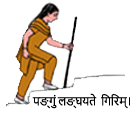An Osho story tells about a doctor who went to a village in Bastar district. A patient approached him. The doctor scratched the name of the drug on a piece of earthenware as there was nothing to write on. Then, he said, 'levigate this drug in milk and take it for a month.' The patient returned after one month. Doctor asked, 'how are you now?' He replied, ' Fine. Please give me another piece with the name of the drug written on it'. The doctor was surprised and asked, 'what do you mean?' The patient said, 'I levigated that piece of earthenware and consumed it. It is worn out now. It was a very nice medicine.'
This story is an excellent example of healing a disease without a drug. In Ayurveda, Charakacharya says,' There is nothing like a non-drug in this world – everything can work as a drug.' If a patient forgets his ailment on hearing a song, then that song is his drug. Though not a simple concept, these examples indeed prove the importance of a placebo.
Placebo means a drug that appears similar to the original drug but does not have any pharmacologic action. For example, getting admitted to a hospital for weakness and infusing intravenous 'saline' is also treating with a placebo.
Placebo can be helpful in a few situations. Pain relief due to a placebo is known to be related to opioid chemicals in the brain. The placebo effect is, therefore, considered as physical rather than purely psychological. It appears that the efficacy of a placebo depends on several factors such as the patient's personality and expectations, behavior and personality of the doctor, doctor-patient communication, nature of the disease, and the cost and form of the placebo. The pain of arthritis is a subjective perception that cannot be appropriately measured. The condition keeps on varying in severity. Placebo thus appears to be effective in 20-25% of patients with arthritis.
Patients have their ideas and expectations about their disease. Some patients feel better just by visiting their doctor. One school teacher came from Latur city to see me for his neck sprain. He started feeling better in the clinic reception itself! Any drug prescribed by a trusted doctor is suitable for that particular patient. Thus, doctor-patient communication is crucial. Having faith in prescribed medicine is also essential. The importance of this faith is rightly stated in the ancient Hindu religious text Vishnu-shodash-nam "Aushadhe Chintayet Vishnum" (invoke Lord Vishnu while taking medicine). Some doctors have a placebo personality. Their personality, their demeanor is such that the patient feels better with any drug prescribed by him. Such doctors, with their speech and behavior, can increase the efficacy of a drug. A placebo given by a loving, sympathetic and prompt doctor is more effective. A study was conducted at an electric company in Hawthorn (Australia) from 1928 to 1932. This study showed that industrial production increases if the employees are adequately motivated. This phenomenon is called the Hawthorn effect. Earlier recovery is possible if the doctor communicates well with the patient, if all patient doubts are cleared, if the patient is reassured and made well-aware about the disease. The doctor's attire, behavior, voice, wording, body language, and atmosphere of his clinic can also have such an effect.
A study concluded that homeopathic drugs are effective due to the doctor's communication skills and not due to the direct effect of the drugs. The form of medicine is also crucial in this respect. A placebo injection is more effective than a placebo tablet. Some patients get pain relief for two days though the half-life of the tablet administered may be just 8-12 hours.
Intravenous injection is more effective than intramuscular one, and surgery is much more effective than any injection. Headache is sometimes relieved by an expensive investigation such as MRI. The chest pain of angina can stop after opening the chest in an operation theater without correcting the blocked vessel. Piercing needles as acupuncture or vomiting, enema, or application of leeches as in Ayurveda panchakarma are helpful in some cases. One may postulate that the very nature of these treatments leads to placebo effects.
A Cochrane review concluded that placebo treatments produced no significant health benefits. However, they had a modest effect on outcomes reported by patients, such as pain. Furthermore, the impact on pain varied from large to non-existent, even in well-conducted clinical trials. Variations in the placebo effect were partly explained by variations in how the trials were conducted, the type of placebo used, and whether patients were informed that the study involved placebo.
Over 50% of physicians in the US prescribe placebo treatments in various forms. However, international guidelines do not allow doctors to prescribe a placebo. Placebo medicine is permitted only in clinical drug trials after obtaining necessary approvals from government agencies and institutional review boards.
